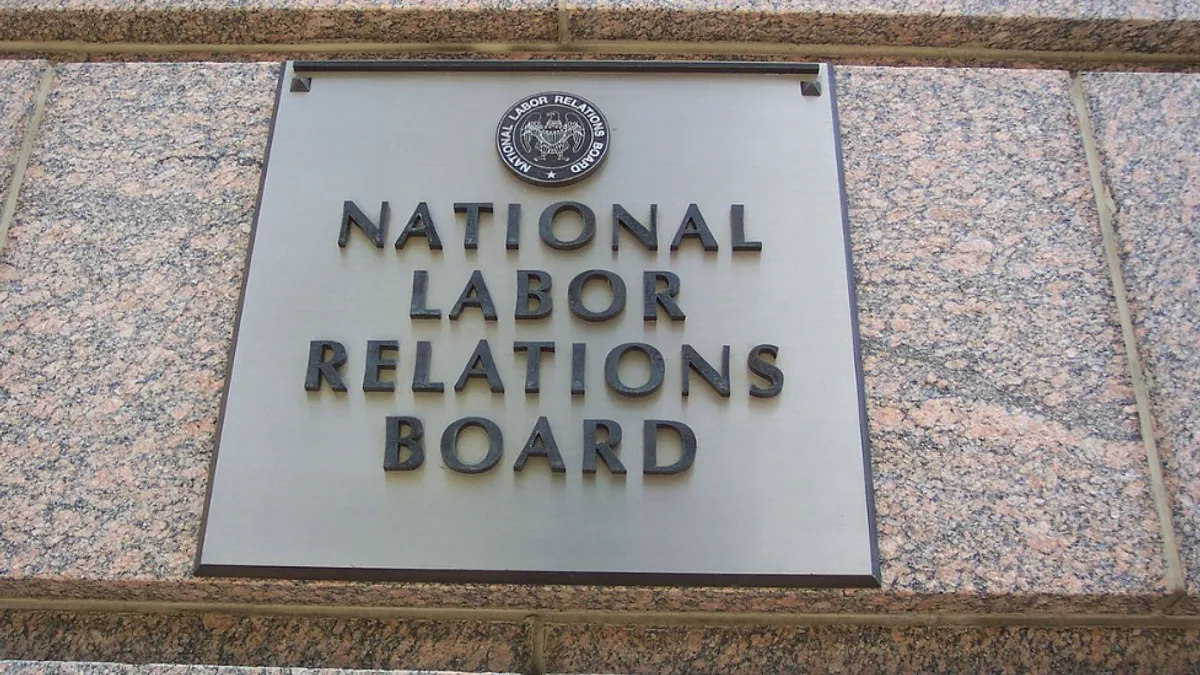Dive Brief:
- The National Labor Relations Board published Thursday a rule updating the standard for determining when multiple employers may be considered joint employers under the National Labor Relations Act. The rule was published in the Federal Register on Friday; it will take effect 60 days after that.
- NLRB’s new joint employer rule retains much of the same details from its 2022 proposed rule, specifying that an entity may be considered a joint employer of another employer’s employees if the two share or codetermine essential terms and conditions of employment. Per the rule, joint employers may possess or exercise direct or indirect control over one or more essential terms and conditions of employment.
- The National Grocers Association (NGA) and FMI – The Food Industry Association both said separately that they are disappointed with the rule.
Dive Insight:
When the NLRB proposed the rule last year, FMI and NGA pushed back on the potential updates, claiming an expansion of the concept of a joint-employer relationship would make that standard applicable to most business-to-business relationships involving employees.
Following the rule’s publication last week, the NGA on Friday reiterated its stance that the regulation “only worsens” existing challenges for independent grocers.
“This final rule considerably broadens the existing definition of a ‘joint employer,’ exposing independent community grocers, cooperatives, and other small businesses to legal uncertainty and an increased likelihood of litigation,” NGA Senior Vice President and Counsel Chris Jones said in a statement last week.
Jones said that the rule could also raise labor costs at a time when independent grocers are grappling with labor shortages and workforce gaps.
FMI raised similar concerns, claiming the final rule will “upend operational relationships” within the food industry.
“FMI members have unique needs in meeting staffing requirements and the rule's expansion of the essential terms and conditions of a joint employer relationship to capture health and safety standards and hours of work and scheduling will negatively impact every aspect along the food and consumer goods supply chain,” FMI Vice President of Government Relations Christine Pollack said Monday in an emailed statement.
NLRB’s final rule will essentially reinstate the standard articulated by the 2015 Obama-era board in Browning-Ferris Industries, a case that has been the center of a nearly decade-long employment law saga. It also supplants NLRB’s recent joint employer rule, issued in 2020 under a Republican-majority board, which limited joint employer responsibilities to employers that possess and exercise direct and immediate control over essential employment terms.
Changes from the proposed rule include an exhaustive list of seven categories of employment terms or conditions that the board will consider essential for the purposes of its joint employer analysis, as well as a description of those it will consider “irrelevant” for such analysis. The final rule also addresses joint employers’ bargaining obligations.
The new final rule specifies that essential terms and conditions of employment include:
- Wages, benefits and other compensation.
- Hours of work and scheduling.
- Assignment of duties.
- Supervision and performance of duties.
- Work rules and directions governing the manner, means and methods of performance as well as grounds for discipline.
- Tenure of employment, including hiring and discharge.
- Working conditions related to safety and health of employees.
Evidence of an employer’s control over matters that are “immaterial” both to the existence of a common-law employment relationship as well as control over matters that do not bear on essential employment terms and conditions, is not relevant to NLRB’s joint employer inquiry, per the rule.
“The Board’s new joint-employer standard reflects both a legally correct return to common-law principles and a practical approach to ensuring that the entities effectively exercising control over workers’ critical terms of employment respect their bargaining obligations under the NLRA,” NLRB Chairman Lauren McFerran said in a press release. “While the final rule establishes a uniform joint-employer standard, the Board will still conduct a fact-specific analysis on a case-by-case basis to determine whether two or more employers meet the standard.”
Evan Armstrong, VP of workforce at the Retail Industry Leaders Association, called the final rule a “vague, unworkable” risk to businesses whose supply chains rely on business-to-business interactions.
“This overreach is disappointing but not surprising given the current actions of the NLRB,” Armstrong said in an email to HR Dive. “Oversight is sorely needed to reign in the NLRB from exceeding its statutory authority, and RILA will assess all available options to limit the Board’s constant attack on workers.”
Catherine Douglas Moran contributed reporting.















